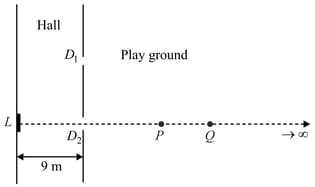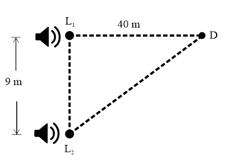Superposition of Waves
Superposition of Waves: Overview
This topic covers concepts, such as, Reflection and Transmission of Waves, Reflection of Waves at Fixed Ends, Equation of Resultant Sound Wave after Interference & Quincke's Tube etc.
Important Questions on Superposition of Waves
The equations of two waves are given by :
These waves are simultaneously passing through a string. The amplitude of the resulting wave is :
The interference pattern is obtained with two coherent light sources of intensity ratio . And the ratio is . Then, the value of will be equal to :
Two light beams of intensities in the ratio of are allowed to interfere. The ratio of the intensity of maxima and minima will be :
Two sound waves of frequencies and and having same amplitude '' are interfering. A stationary detector, which can detect waves of amplitude greater than or equal to . So, in a given time interval of seconds, find the total duration in which detector is active.
A loud speaker is placed in long narrow hall with two doors and open to the very long play ground as shown in figure. The distance is , distance between two parallel walls of hall is . The loud speaker is fitted to the wall on a line perpendicular to which passes through door . On same line one interference maxima is obtained at at distance from door . It is known that loud speaker emits monotomic sound of frequency , and because of presence of some other gas in hall and bit high temperature speed of sound waves in hall is while in air in ground is .

Three simple harmonic waves, identical in frequency and amplitude A moving in the same direction are superimposed in air in such a way, that the first, second and the third wave have the phase angles and , respectively at a given point in the superposition. Then as the waves progress, the superposition will result in
There are three strings as shown in the figure. Their mass and lengths are respectively. All the strings are under same tension. Wave- travelling in is incident at . It is partly reflected (Wave-) and partly transmitted (wave-). Now wave- is incident at . It is again partly transmitted (wave-) and partly reflected (wave-). Choose the CORRECT option(s).
("" is amplitude of corresponding waves, represents corresponding wave speeds)

Two waves, each with an amplitude of are superimposed with constructive interference such that they are in phase. What is the resultant amplitude?
When two progressive waves and are superimposed, the amplitude of the resultant wave is . Find the value of .
Two identical sources of sound and produce intensity at a point equi distant from source. If power of is reduced to and phase difference between two sources is varied then let is maximum intensity at point . Find
Two speakers connected to the same source of fixed frequency are placed apart in a box. A sensitive microphone placed at a distance of from their midpoint along the perpendicular bisector shows a maximum response. The box is slowly rotated until the speakers are in line with the microphone. The distance between the midpoint of the speakers and the microphone remains the same. Exactly five maximum responses are observed in the microphone in doing this. The wavelength of sound wave is (in ):
A wave represented by the equation is superposed with another wave to form a stationary wave such that the point is a node. The equation of the other wave is,
A man standing on a cliff claps his hand hears its echo after . If sound is reflected from mountain and velocity of sound in air is . Then, the distance between the man and reflection point is,
Phase difference between the incident and reflected wave, when the reflection happens at fixed end:
Two loudspeakers and driven by a common oscillator and amplifier are arranged as shown. The frequency of the oscillator is gradually increased from zero and the detector at records a series of maxima and minima. If the speed of sound is , then the frequency at which the first maximum is observed is

An observer receives waves directly from a source of sound distant in a big hall. He also receives waves reflected from the mid-point of high ceiling. The wavelength of sound for constructive interference to take place between two waves, must be
An organ pipe open at both ends produces:
The disturbances produced by two sound sources cannot be cancelled as the disturbance by each wave is added.
What do you understand by principle of superposition of waves?
Describe the reflection of the wave from a free end.
